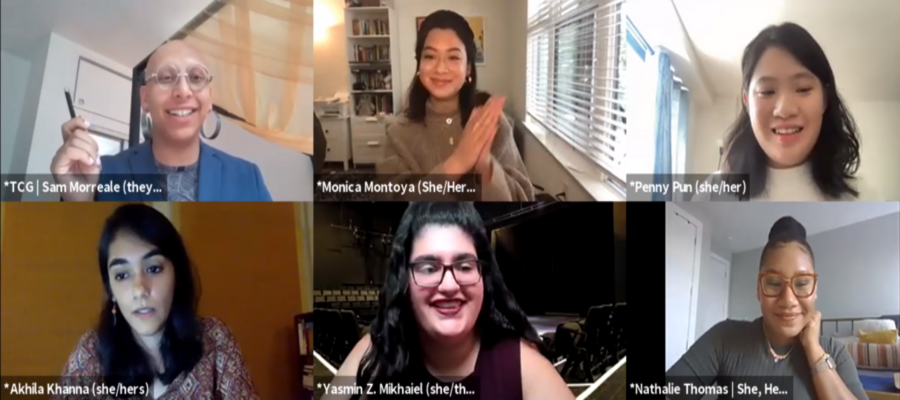After seeing an open call for session ideas and potential conversations for Theatre Communications Group’s 2021 virtual conference, Sam Morreale (they/them) decided to chime in. Morreale had watched over the last year as the field appeared to rally around artists, but knowing as they do the true impact the industry’s gig economy can have on young people, especially people of color, Morreale saw an opportunity for TCG’s conference to do more. They envisioned a chance for young people to find support and build community in an industry where the idea of “networking” can feel exhausting.
“I was feeling a lack of conversation surrounding, particularly, early-career young arts administrators in this field during the past year,” said Morreale. “I just kept thinking about all the other folks who are graduating into this pandemic when there are no positions open, and seeing a lack of conversation about how to uplift them.”
Morreale, who had previously worked with TCG, found open ears for their idea, and was soon contracted to participate in this year’s conference planning. Devon Berkshire (she/her), TCG’s director of conferences and fieldwide learning, had received similar proposals and had begun putting out feelers for what would become a small team of TCG staff under the age of 30 who pulled together to discuss conference programming specifically designed by, for, and about theatremakers 30 years of age and younger.
Making up the team were Morreale, Sarah Machiko Haber (she/her), and Anne Ciarlone (they/she). Immediately, Ciarlone, TCG’s manager of event production, had a few big bucket items in mind. Clear ideas started to form, like the desire to talk about universities and higher education, as well as the need to address the pipeline from education to jobs after graduating into a field that is still ostensibly working to move away from unpaid internships. Additionally, the group wanted to prioritize programming representing a vast plethora of people, inviting more people to the table as the field imagines a new future.

“I just felt like my peers were already having these conversations almost on a daily basis,” said Ciarlone. “So I think time was of the essence for us. In our early meetings, we were very aware of that.”
The group amassed ideas and knowledge from fellow TCG staff members to build on and complement the rest of the conference programming, and began to tailor a series of conversations to a group that would come to be called “the inheritors.” This full afternoon of programming—which covered topics like lateral mentorship, the tokenization of young people, and decolonizing theatre spaces and practices, as well as an in-depth follow up to Ciara Diane’s American Theatre article, “When the Students Have Notes for the Teachers”—filled an afternoon with programming that I won’t hesitate to say left me, a slightly out-of-the-target-age-range 31-year-old, feeling incredibly inspired.
For one, it was a rare opportunity for young folks, who truly have a vision for a better future in the industry, to actually lead and participate in some of these industry-shaping conversations. So often these conferences have been geared toward established leaders who continue to lead rather than those who are actively trying to learn in anticipation of future leadership. After all, TCG is a member organization, and its conferences are an opportunity for many of the industry’s leaders to continue conversations with colleagues they’ve known for years. That’s fine as far as it goes, but one major benefit of this “inheritor” programming was the chance to make these conversations intergenerational, allowing those approaching the field with perhaps the freshest eyes to run the table and have their say in the major topics facing the industry today.
“So much of what we wanted to make happen with all of the sessions was bridge-building between young folks, and recognizing the power that we already have,” said Morreale, pointing to what the group called “internalized paternalism” in the industry. They were referring to an ingrained structure that tends to minimize contributions from those who are younger, instead implying—or, occasionally, outwardly saying—that young artists and administrators simply don’t know what they’re doing or talking about yet.
“A lot of this programming wanted to really push against that,” Morreale continued. “The way that it wanted to is to think about coalescing, really building relationships between one another and understand that under-30 folks have a lot to offer each other right now, and don’t necessarily have to consistently rely on these hierarchical relationships.”
All three organizers were clear: This programming wasn’t meant to exclude or in any way discount the role or impact of those who have been in the field for a long time. The idea instead was to widen the conversation. Theatre is an intergenerational art form, and there’s no reason to approach learning opportunities with anything other than an abundance mindset. As Haber, TCG’s equity, diversity, and inclusion initiatives associate, noted, many young people are eager to learn and participate, but they’re met with a dearth of opportunities to do so.
There was also an express desire to stay away from the term “emerging,” since that term can apply to any age entering the field, and doesn’t guarantee a focus on those who are on the younger end of the spectrum. As Haber noted in her afternoon-opening plenary speech, a session titled “Dreaming With the Inheritors” that included both Haber’s speech and a roundtable discussion, these inheritors have a certain shared lived experience.
For instance, many at the top of this age cohort would have just been turning 18 and voting for the first time when Barack Obama made history in 2008. The same group had been at a particularly impressionable age on Sept. 11—I myself was in 6th grade at the time, and it’s a vivid memory to this day. Add to that the nature of growing up almost entirely engulfed by technology and social media, and, as Ciarlone pointed out, amid the mounting pressure that climate change is putting on us all but especially those who will inherit an environmental crisis, and it’s clear where generational bonds can begin to form. The latter point shines a light on the simple fact that young people could use help—especially help in the form of informed, curated conversations around topics that impact them.

“I remember really clearly my first TCG conference my first year on staff, which was St. Louis in 2018,” Ciarlone said, “just being like, ‘Oh my God, I won the jackpot to be a 26-year-old person who has access to this wealth of knowledge and network of elders of all generations.’”
In fact, that feeling was echoed in TCG Gala honoree Ricardo Khan’s prerecorded acceptance speech last week. In his speech, he recalled that he and L. Kenneth Richardson, co-founders of Crossroads Theatre Company, had an early desire to attend a TCG conference when they were starting out, to join this community as the two of them searched for their place within the theatre field. Unfortunately, that first year they did not have the money to attend. Thankfully, as Khan went on to point out, not only was he able to attend later in his career and eventually become TCG’s board president; he also was onstage for August Wilson’s historic 1996 keynote speech, “The Ground on Which I Stand.”
Moments and conferences like this are a chance to be around people who are out there, actually doing the work that inspires, that challenges, that shapes the future. Still, Ciarlone said, the feeling can be as bittersweet as it is exciting.
“I knew it was rare,” they said, “and I knew that there were so few people under the age of 30 who were having access to that.”
The programming these three organizers pulled together, which came together over a feverish month, would be a chance for this group to pull down some of the access barriers to this information—a goal Ciarlone had had ever since their first conference. It can be tiring to only have dialogues about complicated issues the field is facing with only those in your limited early-career network, or only on social media, where little room is left for nuance in the “you’re wrong, I’m right” digital realm. The conference, Haber added, was an opportunity to add that nuance.
Morreale added that one day, these are the people who will be in positions of power. So it makes sense to start building a collective value system through these conversations, in the hopes that, once those positions of power are eventually obtained, less energy will need to be spent worrying and wondering who in the field shares your values. That community building work will already have been done. As Ciarlone reflected on the journey that brought them to TCG in the first place, they noted the importance of those around them who were in the age range of, say, an older sibling.
The results of their labor were sessions that were universally enjoyed. As Morreale pointed out, older generations in attendance at the conference were also able to find enjoyment, and indeed moments of learning by tuning into these sessions. It gave them hope, Morreale said, that true intergenerational collaboration was possible.
It’s an idea that stands in contrast to the feeling some have—that there’s a wall to be scaled just to have their needs and thoughts heard, and to be seen as collective partners in an industry supposedly built on collaboration. In our conversation, the idea was raised of having some young people on boards—not just youth boards, but full members.

“What’s stopping people from making them full voting members?” Haber asked rhetorically. “Oh, well they don’t understand this concept. Okay, can you take the time to explain that concept to them? If you’re in a 501(c)3 and you’re on a board, could you please take the time to explain to them how that works, or how this particular investment works or whatever it is you’re actually discussing? To me, that’s an active dismantling of white supremacy, because what you’re talking about there is time and urgency. So why aren’t you taking the time to explain this thing. Oh, well they don’t have time for that. Okay. Why don’t you have time for that?”
Haber added that she’s waiting for the industry to surprise her—for those in positions of power to see the impact and passion that these inheritors can have and then give them true agency. In the meantime, as full structural changes to address this are slow in coming, the hope is that events like these can continue to happen for the industry’s future leaders. Hopefully more theatres will follow the example of some TCG member theatres who took the initiative to send their under 30 staff to have these conversations.
Ideally, future events could allow for the additional in-person conference benefits that are tough to replicate on Zoom. The ability to continue conversations after a session as you mill around a lobby, or the chance to grab a drink at the end of a day to download information with new colleagues, are moments that cement lasting connections. This feeling inspired the afternoon’s cap: a happy hour hosted by the three organizers.
“I love theatre,” Haber said, “but so much of my bond with the people who I want to create with has to do with who they are as people, how they show up in the world.”
Should the group have another attempt at this programming in the future, Haber has already begun taking notes on what she’d like to improve. She hopes there can be more of a chance to bring even more voices to the table, build a larger community and coalition around the building of these sessions. In the meantime, the group offered a few reminders for their fellow 20-somethings making their way through the field.
Morreale noted that they spent much of their 20s feeling like a community would come to them and create a space for them. And while, yes, Morreale said, the industry should absolutely continue to open doors and make room, it’s easy for those who are younger to underestimate their own ability to make and take space for themselves. Haber and Ciarlone both echoed with similar sentiments: a reminder that you are indeed allowed to have a life and interests outside of the theatre. Ciarlone said a misstep of their early 20s was being reserved and laser-focused on theatre and their career over other elements in their life. There’s certainly a balance between the fervent pursuit of a career in an industry often rife with burnout, and taking a breath to discover yourself as a person outside of the art.
Early on in the session planning process, a question came up about whether the topics broached in these sessions would be too intense. Would people stop listening? That never happened. Instead these inheritors shined new light on topics pertinent to the theatre field at large, but more importantly topics that directly impact their lives and careers. There was a realization that, for this generation, raising your voice about what’s wrong isn’t disruptive or combative, as it may have been seen in the past. It’s necessary and empowering.
“It is the act of naming the thing that shows that we care enough to show up to the conversation,” Ciarlone concluded, “to fix the things that should be fixed.”
Jerald Raymond Pierce (he/him) is associate editor of American Theatre. jpierce@tcg.org





